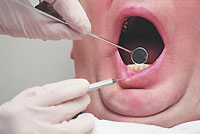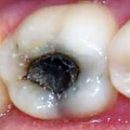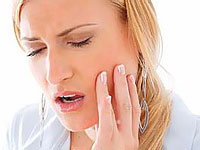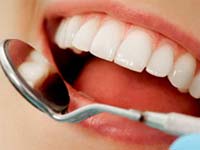How the inflammation of the mucous membrane is manifested? How to properly diagnose and find out the cause of the disease? What should be the prevention of stomatitis?
Content
Stomatitis
Stomatitis - Inflammation of the mucous membrane of the oral cavity. Stomatitis can develop as an independent disease and can be one of the symptoms of other diseases (measles, scarletin, influenza, candidiasis, etc.). In cases where inflammation is developing only in the language, it is called «glossitis», on the desna - «gingivitis»; Glossite and gingivitis have some features.
The causes of stomatitis are the exacerbations of chronic diseases of the internal organs, the nervous system, disruption of metabolism, lack of vitamins in food, violation of the function of the glands of the internal secretion. Smoking, consumption of strong alcoholic beverages, the reception is very hot or very cold, excessively acidic and salty foods can also be caused by stomatitis. Sometimes the disease occurs with increased sensitivity to drugs, especially when self-medication, can occur during puberty, with difficulty teething tooth wisdom. Inflammatory changes in the oral mucosa are possible in hypovitaminosis, endocrine disorders, diseases of the gastrointestinal tract, cardiovascular and nervous system, blood, diffuse diseases of the connective tissue.
There are different shapes of stomatitis, but they all have common signs: redness of the oral mucosa, swelling of nearby fabrics, pain, increasing submandibular lymph nodes. Stomatitis can flow in acute form when inflammation of the mucous membrane develops quickly, is distinguished by severe pain. The chronic shape of stomatitis flows sluggish, long, with a small pain.
What happens stomatitis
Traumatic stomatitis Developed as a result of mechanical injury of the mucous membrane of the oral cavity, including when injured by her sharp edges of teeth, dentures, dentures, or influence on it, chemicals, hot food, ionizing radiation. The prolonged effect of a weak traumatic factor, for example, a poorly fitted dental prosthesis, can lead to hypertrophy of the sections of the mucous membrane, and the appearance of papillomatous expansion on them. Treatment is to eliminate the traumatic factor, the treatment of the oral cavity with solutions of antiseptics. In the presence of pain, the appliques of painkillers are shown. Need careful teeth rehanging. When exposed to chemicals, rings with water or neutralizing solutions are prescribed as emergency assistance, drugs that contribute to epithelization are additionally used.
 Nazno-necrotic stomatitis Venzanana (ulcerative stomatitis, ulcer-membrane stomatitis, fuzospi-stomatotic stomatitis, ulcerative-gangrenous stomatitis, stomatitis Plata - Venzanan) causes a spherose-like bacterium in symbiosis with a conventional spirochet of the oral cavity. The occurrence of the disease contributes to a decrease in the overall resistance of the body, vitamin failure. The disease is characterized by the appearance of erosion or ulcers, an increase in body temperature to 37.5-38°C, the soreness and bleeding of the gums, hypersion, rotten smell of mouth. It usually begins with the appearance on the gums of the ulceration, which is covered with a gray bloom; The resulting ulcers extend to other areas of the oral mucosa. The disease proceeds with increasing body temperature, chills, common malaise; Anniversary smell of mouth appears; Lymphatic glands are increasing under the lower jaw, eating difficulty.
Nazno-necrotic stomatitis Venzanana (ulcerative stomatitis, ulcer-membrane stomatitis, fuzospi-stomatotic stomatitis, ulcerative-gangrenous stomatitis, stomatitis Plata - Venzanan) causes a spherose-like bacterium in symbiosis with a conventional spirochet of the oral cavity. The occurrence of the disease contributes to a decrease in the overall resistance of the body, vitamin failure. The disease is characterized by the appearance of erosion or ulcers, an increase in body temperature to 37.5-38°C, the soreness and bleeding of the gums, hypersion, rotten smell of mouth. It usually begins with the appearance on the gums of the ulceration, which is covered with a gray bloom; The resulting ulcers extend to other areas of the oral mucosa. The disease proceeds with increasing body temperature, chills, common malaise; Anniversary smell of mouth appears; Lymphatic glands are increasing under the lower jaw, eating difficulty.
Aphtose Stomatitis develops as an independent disease, but often this form is related to diseases of the digestive. There is a general ailment, then separate rounded small foci of surface ulcerations coated with a yellow bloom are formed in the oral cavity. they are surrounded by a red rim and often sharply painful. Aphtheasian Stomatitis in acute form more often sick. Aphtose Stomatitis can flow chronically, occasionally occasionally occurring and new rash AFT. The chronic form of aphthose stomatitis is related to the disease of the gastrointestinal tract (gastritis, colitis), liver, etc.
Infectious Stomatitis may be one of the manifestations of a number of common infectious diseases. Acute herpetic stomatitis, which is considered as a manifestation of primary infection of the oral cavity with a variety of herpes. There is an increase in body temperature up to 38 - 40 °WITH. Associated funds that stimulate the protective forces of the body are prescribed, the oral cavity is treated with antiseptic solutions, proteolytic enzyme preparations.
Vesicular Stomatitis It causes one of the robdaruses, which is transmitted to a person from domestic animals or people food or air-droplet. Vesicular stomatitis resembles a flu infection. Incubation period 1-5 days. The disease begins with lifting the body temperature, the appearance of pain in the joints, muscles, headaches, bubbles (vesicles) are formed on the mucous membrane of the oral cavity, which are preserved 10-12 days and are subsequently transformed into erosion. Treatment is carried out by antiviral drugs (oxolin, tebrofen, redox ointment, etc.), rinses are prescribed, the oral cavity is treated with antiseptic solutions.
Medical Stomatitis It occurs as a result of the intolerance of medicinal substances (more often when taking into antibiotics, sulfonamide products, iodine preparations, bromine, etc.). Manifestations of drug stomatitis in the oral cavity are very diverse, the same substances can cause different shapes of stomatitis in humans.
Candadose stomatitis can develop with improper use of antibiotics, as well as in seriously ill elderly or in sharply weakened, especially premature, infants. At the same time, on different sections of the mucous membrane appear raids in the form of white films.
Stomatitis at intoxicating heavy metals salts. With light intoxication of lead salts, bismuth, mercury usually occurs Catarial Stomatitis with pygmentation sites on the mucous membrane of the oral cavity (primarily the gum edge). In severe cases, ulcerations are developed, characterized by a focus. In addition to pain, disorders of salivation and sensations of metal taste In the mouth of patients, weakness, digestive disorders and other signs of intoxication.
For the prevention of diseases of the mucous membrane of the mouth, it is necessary to maintain the teeth, removal of dental deposits, timely change of poorly adjacent dentures, timely treatment of caries of teeth, removal of destroyed teeth, which are a hearth infection. Sanitation of the oral cavity in diabetes, diseases of the cardiovascular system, etc.









